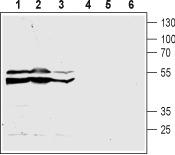CysLT2 (CYSLTR2) Rabbit Polyclonal Antibody
Other products for "CYSLTR2"
Specifications
| Product Data | |
| Applications | FC, WB |
| Recommended Dilution | WB: 1:200-1:2000; IHC: 1:100-1:3,000; FC: 1:50-1:600 |
| Reactivities | Human |
| Host | Rabbit |
| Clonality | Polyclonal |
| Immunogen | Peptide (C)HLTTWKVGL(S)KDRLH, corresponding to amino acid residues 270-284 of human CysLTR2. 3rd extracellular loop. |
| Formulation | Lyophilized. Concentration before lyophilization ~0.8mg/ml (lot dependent, please refer to CoA along with shipment for actual concentration). Buffer before lyophilization: Phosphate buffered saline (PBS), pH 7.4, 1% BSA, 0.025% NaN3. |
| Purification | Affinity purified on immobilized antigen. |
| Conjugation | Unconjugated |
| Storage | Store at -20°C as received. |
| Stability | Stable for 12 months from date of receipt. |
| Gene Name | cysteinyl leukotriene receptor 2 |
| Database Link | |
| Background | LTC4, LTD4, and LTE4 are cysteinyl leukotrienes (cys-LTs) peptide conjugated lipids derived from arachidonic acid as a result of immune or inflammatory stimuli. The above mentioned cys-LTs bind and activate two receptors belonging to the G-protein coupled receptor superfamily, CysLTR1 and CysLTR2 (also named cysLT1 and cysLT2 respectively). There is evidence though that other receptors are yet to be identified. These two receptors couple to both pertussis toxin sensitive (Gi/o) and insensitive (Gq, which initiates Ca2+ influx) G-proteins for their signaling. The G-protein coupled to is probably determined by which ligand binds the receptor as all three cys-LTs can activate the two receptors albeit with different affinities. In mouse, CysLTR1 and CysLTR2 are subject to alternative splicing. CysLTR1 receptor expresses greater affinity for LTD4 and binds equally to LTC4 and LTE4whereas CysLTR2 has greater and equal affinity towards LTC4 and LTD4 over LTE4. Human CysLTR1 is highly expressed in spleen, peripheral blood, leukocytes. It is less strongly expressed in lung, small intestine, pancreas and hardly or not expressed in liver, colon, kidney, skeletal muscle, testis heart and brain. On the other hand, CysLTR2 is highly expressed in spleen and leukocytes. Its expression in the heart, brain, spinal cord and adrenal gland differs it from that of CysLTR1. Cys-LTs and their receptors are involved in respiratory diseases like asthma and other conditions such as cancer cardiovascular, gastrointestinal, skin and immune disorders. |
| Synonyms | CYSLT2; CYSLT2R; GPCR21; HG57; hGPCR21; HPN321; KPG_011; PSEC0146 |
| Reference Data | |
| Protein Families | Druggable Genome, GPCR, Transmembrane |
| Protein Pathways | Calcium signaling pathway, Neuroactive ligand-receptor interaction |
Documents
| Product Manuals |
| FAQs |
{0} Product Review(s)
0 Product Review(s)
Submit review
Be the first one to submit a review
Product Citations
*Delivery time may vary from web posted schedule. Occasional delays may occur due to unforeseen
complexities in the preparation of your product. International customers may expect an additional 1-2 weeks
in shipping.






























































































































































































































































 Germany
Germany
 Japan
Japan
 United Kingdom
United Kingdom
 China
China




